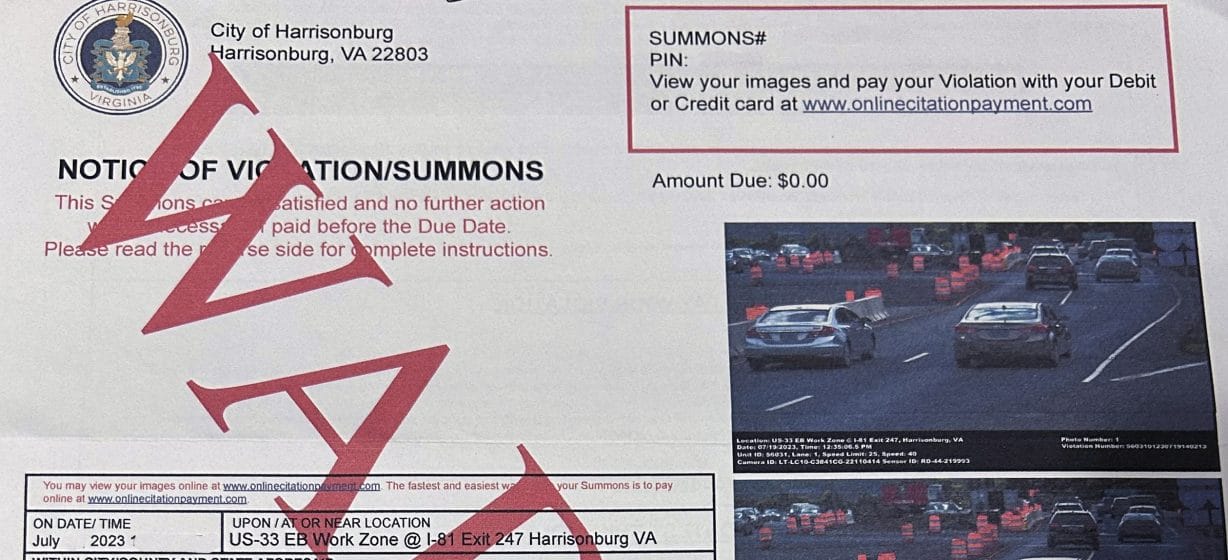
By Sukainah Abid-Kons, contributor
Thousands of people opened an unwanted surprise in their mail over the summer ever since the city installed speed cameras on East Market Street where construction has begun on improvements to the I-81 overpass.
Speed notices arrived in droves with the word “WARNING” written diagonally across the front.
In fact, when The Citizen interviewed Capt. Jason Kidd of the Harrisonburg City Police Department, the city had issued more than 25,300 warnings. So, if you received one, you were far from alone. In fact, among the recipients were some of the city leaders who approved the camera in the first place, including Mayor Deanna Reed, who voted to allow the device.
“Yes, that is correct,” Reed said, then laughed after being asked about the warning. “These laws apply to everyone, even elected officials, and I will be making sure to go the speed limit from now on!”
The Harrisonburg Police Department installed the speed cameras on East Market Street, near the I-81 ramp in June. There is one on each side of the road, monitoring traffic in both directions. The cameras take photos of cars that go over the 25-mph limit in the work zone.
During the warning period, those captured exceeding the speed limit received the warnings in the mail, but starting Aug. 16, drivers speeding in the work zone have begun receiving citations — the real thing — in the mail. These citations come with a $100 fine but will not affect someone’s driver’s license safety points.
Many area college students might not know about the new cameras because most left Harrisonburg before they went up and have returned after Aug. 16. To ensure returning college students at JMU and EMU are aware of the camera, police officers are making it a focal point of their annual “knock and talk,” where members of HPD and partner agencies visit off-campus student housing areas to discuss important topics related to the city and the student population.
The Harrisonburg Police Department requested the cameras to deter people from speeding through the construction zones, and the city council at its May 23 meeting approved the use of cameras in construction and school zones.
Reed said the request came after a string of incidents in which people have gone well over the 25-mph limit through work areas. Speeding in work areas isn’t a problem exclusive to Harrisonburg. In 2021, there were 28 deaths related to car accidents in work zones in Virginia, two of which were construction workers hit by cars while on the job.
Kidd, who is also commander of the police department’s Special Operations Bureau, said research and results about cameras’ effectiveness prompted the department to request a camera be installed in the East Market Street corridor. One study found that areas with fixed-speed cameras experienced a 35% reduction in accidents that caused injuries.
Kidd emphasized that the goal of the camera is to help promote safe driving, not to penalize people who speed.
“It’s not about the violations,” Kidd said. “In fact, we’re really hoping to minimize the violations and hope that there will be less with time, and it really comes down to safety.”
Michael Parks, Harrisonburg’s director of communications, said from late June to late July, the camera’s system recorded more than 34,500 people speeding in that section of the East Market Street corridor.
“And with people working right beside or sometimes in the roadway, and the traffic pattern in this area shifting often, excess speed can be deadly – not only to road crews but to drivers,” Parks said.
Both Parks and Kidd said the majority of cars flagged for speeding by the camera between June and July were going more than 40 mph, which is 15 mph above the posted limit.
Kidd said the work zone speed limits are set at 25 mph because of the research available about how speed impacts accident outcomes.
The American Automobile Association (AAA), found through research that the risk of severe injury from a vehicle/pedestrian collision is about 25% at 25 mph. However, when a car is going 45 mph, that risk jumps almost 90%. Kidd said there have been collisions and close calls in that East Market corridor before.
The cameras monitor cars as they go through the designated area. Each is calibrated to detect a car’s speed. Cars captured going above that speed are then photographed, and the image of the license plate allows the police to send a citation to the person to whom the car is registered.
Kidd said if the person on the car registration was not driving when the speed violation occurred, there is a process through which the fine can be reassigned to the driver. Drivers who receive citations will have multiple options for paying the fine, including online.
Kidd said the department isn’t currently working on installing other cameras. Instead, police are more focused on evaluating how effective these first cameras are at getting drivers to slow down on East Market Street.
“This isn’t about making money from the violations for us,” Kidd said. “The hope is that, over time, we’ll see the number of violations decrease as people slow down in that area.”
Thanks for reading The Citizen, which won the Virginia Press Association’s 2022 News Sweepstakes award as the top online news site in Virginia. We’re independent. We’re local. We pay our contributors, and the money you give goes directly to the reporting. No overhead. No printing costs. Just facts, stories and context. Thanks for your support.













